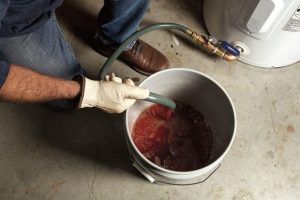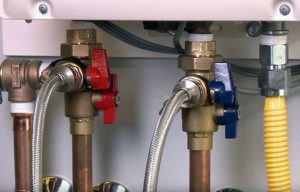Flush Hot Water Heater
Flush Hot Water Heater is an important maintenance task that helps remove sediment and mineral buildup, ensuring your water heater operates efficiently. Here’s a step-by-step guide on how to flush a hot water heater:
Materials Needed
Garden hose
Screwdriver or pliers
A large bucket or drainage area
Safety Precautions
Turn off the power supply to your water heater (for electric heaters, turn off the circuit breaker; for gas heaters, set the thermostat to the “pilot” position).
Allow the water inside the tank to cool down. Hot water can cause burns, so it’s crucial to ensure your safety. For more information visit our website: urbansoutfitter
Signs Your Hot Water Heater Needs Flushing

Lukewarm Water
One of the first signs that your hot water heater needs Flush Hot Water Heater is when you notice that your showers and taps aren’t as warm as they used to be. Sediment buildup in the tank can insulate the water, making it harder for the heating element to do its job.
Low Water Pressure
If your water pressure suddenly drops, it could be due to sediment clogging the pipes and fixtures. Flushing your water heater can help clear these blockages and restore water pressure.
Strange Noises
Hearing strange popping or rumbling sounds coming from your hot water heater is a clear indication of sediment accumulation. This noise occurs when the heating element heats the sediment, causing it to shift and make noises.
Rusty or Discolored Water
If you notice rusty or discolored water coming from your taps, it’s a sign that your water heater is rusting from the inside. Flushing the tank can help remove the rusty sediment and improve water quality.
The Benefits of Flushing Your Hot Water Heater
Regularly flushing your water heater can bring about several benefits.
Improved Efficiency
Flushing your water heater removes sediment that can hinder the heating element’s performance. A clean tank allows the heater to work more efficiently, resulting in faster heating and lower energy bills.
Extended Lifespan
Proper maintenance, including flushing, can significantly extend the lifespan of your hot water heater. A well-maintained unit can last well over a decade, saving you the expense of premature replacement.
Cost Savings
By improving efficiency and preventing damage, flushing your hot water heater can save you money on energy bills and costly repairs. It’s an investment that pays off over time.
How to Flush Your Hot Water Heater
Tools and Materials You’ll Need
Before you start the flushing process, gather the necessary tools and materials:
Garden hose
Screwdriver
Wrench
A bucket or hose-end drain
Safety goggles and gloves
Step-by-Step Guide to Flushing

Turn off the power: For electric water heaters, switch off the circuit breaker. For gas heaters, set the control knob to “pilot.”
Turn off the water supply: Locate the cold water supply valve and turn it off.
Attach a hose: Connect one end of the garden hose to the drain valve at the base of the tank and place the other end in a drain or outside.
Open a hot water tap: To relieve pressure in the tank, open a hot water tap in your home.
Drain the tank: Open the drain valve and let the water flow out of the tank. Be cautious, as the water may be scalding hot.
Flush the tank: Allow the water to flow through the tank and out of the hose until it runs clear.
Close the valve: Once the water is clear, close the drain valve.
Turn on the water supply: Open the cold water supply valve to fill the tank back up.
Turn on the power: For electric heaters, restore power by switching on the circuit breaker. For gas heaters, set the control knob back to the desired temperature.
Safety Precautions
Safety is paramount when flushing your water heater. Always follow these precautions:
Turn off the power and water supply before beginning.
Be cautious of scalding water when draining the tank.
Use safety goggles and gloves to protect yourself from hot water and sediment.
Follow the manufacturer’s instructions and consult a professional if you’re unsure.
When to Call a Professional
While Flush Hot Water Heater is a task you can do yourself, there are situations where it’s best to call a professional.
Complex Issues
If you encounter complex issues while flushing, such as leaks, it’s advisable to seek professional help. Attempting to fix these problems yourself may lead to further damage.
Older Water Heaters
Older water heaters, especially those that haven’t been regularly maintained, may require professional attention to avoid causing more harm than good.
Frequent Problems
If you find yourself frequently needing to Flush Hot Water Heater, it could be a sign of underlying problems. A professional can diagnose and address these issues effectively.
Conclusion
In conclusion, regularly Flush Hot Water Heater is a simple yet effective way to ensure it continues to provide hot water efficiently and reliably. By following the steps outlined in this guide and practicing proper maintenance, you can enjoy hot water for years to come.
FAQs
Q. How often should I flush my water heater?
It’s recommended to flush your water heater at least once a year to prevent sediment buildup and maintain its efficiency.
Q. Can I flush my water heater myself, or should I hire a professional?
Flushing your water heater is a task you can do yourself, but it’s essential to follow safety precautions and the manufacturer’s guidelines. If you’re unsure or encounter complex issues, consulting a professional is advisable.
Q. What are the signs that my water heater needs flushing?
Signs that your water heater may need flushing include lukewarm water, low water pressure, strange noises coming from the tank, and the presence of rusty or discolored water from your taps.
Q. Are there any safety precautions I should take when flushing my water heater?
Yes, safety is crucial. Turn off the power and water supply before starting, be cautious of scalding water when draining the tank, and wear safety goggles and gloves to protect yourself from hot water and sediment.
Q. How long can a well-maintained water heater last?
With proper maintenance, a water heater can last well over a decade, potentially up to 20 years, saving you the expense of premature replacement.
